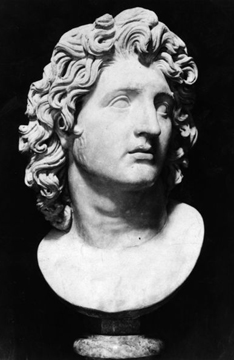|
Alexander the Great:
A leadership role model
By Nagalingam Kumarakuruparan
History is written by victors - Anon
It is often assumed, if the right man emerges for a difficult job, he
will take control of the situation, almost magically, and lead a group
of people to success.
Though such leaders are rare, there are times when a singular person
steps out from the crowd and serves as a paragon of leadership.
 One such individual was Alexander the Great, one of history's most
famous conquerors and a legend of almost divine status in his own
lifetime. One such individual was Alexander the Great, one of history's most
famous conquerors and a legend of almost divine status in his own
lifetime.
Elite category
He belongs to an elite category of individuals who changed the
history of civilisation and shaped the world as we know it today.
From a leadership perspective, Alexander was without peer. He could
be magnanimous towards defeated enemies and loyal towards his friends
and as a General he led by example, literally from the front. He lived
more than 2,000 years ago, but his life offers important leadership
lessons which remain applicable to business and political leaders today.
In recent times three political personalities come to our mind. One
is Obama, son of a cook, becoming the President of the most powerful
democracy in the world. The other is Narendra Modi, son of a tea seller,
becoming the Prime Minister of the largest democracy in the world. Our
own Maithripala Sirisena son of a farmer, becoming the President of this
beautiful island in the Indian ocean.
Focused
Their actions demonstrate what can be accomplished when a person is
totally focused, when he or she has clarity coupled with a “Magnificent
Obsession”. Through dramatic gestures and great rhetorical skills, they
spoke to the collective imagination of their people and won the
commitment of their followers.
Moreover, they are inspired by the teachings of that great apostle of
non-violence, Mahatma Gandhi.
They share between themselves a value system called democracy and
vehemently oppose the anti-liberty principles.
Personal risks
They all stepped out from the crowd at great personal risks to their
lives to serve as a paragon of leadership.
Their ideas and ambitions were bigger than anyone in the party had
envisioned.
They had dreams to remake the country and were ready to test their
ideas in the laboratory of the electorate.
Coming back to Alexander, the great Greek leader had a vision, but
also he knew how to make that vision become a reality.
Alexander surrounded himself with capable lieutenants and wasn't
afraid to give them independence of operation.
He knew how to build a committed team and operated in a way that
allowed his commanders to build on each other's strengths.
Excellence
Alexander set the example of excellence with his leadership style,
which involved sharing his soldiers’ triumphs and woes alike.
The greatness of Alexander lies in his attempt to bring a fusion of
the Greek and Eastern cultures. Alexander was a great warrior. He has
been given the place of world conqueror in the history. He conquered a
large part of the then civilised world. He has been compared with
another conqueror - Napolean Bonaparte. They were great Generals who
were ambitious. They aimed at a world dominion and achieved military
glory.
Difference
The only difference is that whereas Napolean made an attempt to
consolidate his empire and failed, Alexander did not have the time to do
that due to his sudden death. Alexander did not find time and
opportunity to introduce an elaborate system of administration for the
consolidation of his vast empire.
He failed to understand that mere force cannot keep an empire united.
This is the main reason why his empire collapsed immediately after his
death.
Paradoxically Alexander's most valuable lessons were taught not
through his strengths, but through his weaknesses.
little thought to the paramount importance of countervailing powers.
Leaders have the responsibility to put proper mechanisms of
organisational governance into place, using checks and balances to
prevent faulty decision making and the abuse of power.
Alexander began his reign as an enlightened ruler, encouraging
participation by citizens of his conquered territories, in the political
process. Like many rulers before him, However, he became addicted to
power. Hubris raised its ugly head.
He tolerated nothing but applause from his audience, so his immediate
circle kept their reservations to themselves.
As a result he lost touch with reality and that was the beginning of
the end for Alexander.
His empire collapsed immediately after his death. His political
achievements did not have any permanent value. |

